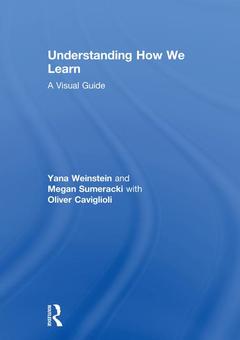Understanding How We Learn A Visual Guide
Auteurs : Weinstein Yana, Sumeracki Megan, Caviglioli Oliver

Educational practice does not, for the most part, rely on research findings. Instead, there?s a preference for relying on our intuitions about what?s best for learning. But relying on intuition may be a bad idea for teachers and learners alike.
This accessible guide helps teachers to integrate effective, research-backed strategies for learning into their classroom practice. The book explores exactly what constitutes good evidence for effective learning and teaching strategies, how to make evidence-based judgments instead of relying on intuition, and how to apply findings from cognitive psychology directly to the classroom.
Including real-life examples and case studies, FAQs, and a wealth of engaging illustrations to explain complex concepts and emphasize key points, the book is divided into four parts:
- Evidence-based education and the science of learning
- Basics of human cognitive processes
- Strategies for effective learning
- Tips for students, teachers, and parents.
Written by "The Learning Scientists" and fully illustrated by Oliver Caviglioli, Understanding How We Learn is a rejuvenating and fresh examination of cognitive psychology's application to education. This is an essential read for all teachers and educational practitioners, designed to convey the concepts of research to the reality of a teacher's classroom.
Acknowledgments Author Profile Illustrator Profile Part 1 Evidence-Based Education and the Science of Learning Chapter 1: Communication Breakdown Between Science and Practice in Education Chapter 2: Different Types of Evidence in Education Chapter 3: Is Intuition the Enemy of Teaching and Learning? Chapter 4: Pervasive Misunderstandings About Learning: How They Arise, and What We Can Do Part 2 Basics of Human Cognitive Processes Chapter 5: Perception Chapter 6: Attention Chapter 7: Memory Part 3 Strategies for Effective Learning Introduction Chapter 8: Planning Learning: Spaced Practice and Interleaving Chapter 9: Development of Understanding Chapter 10: Reinforcement of Learning: Retrieval Practice Part 4 Tips for Teachers, Students, and Parents Chapter 11: Tips for Teachers Chapter 12: Tips for Students Chapter 13: Tips for Parents Glossary
Yana Weinstein is Assistant Professor of Psychology at University of Massachusetts Lowell, USA. Yana is co-founder of The Learning Scientists, http://www.learningscientists.org/, a project whose goal is to make scientific research on learning more accessible to students, teachers, and other educators. Yana tweets as @doctorwhy.
Megan Sumeracki (formerly Smith) is Assistant Professor of Psychology at Rhode Island College, USA. Megan is co-founder of The Learning Scientists, where she aims to increase the use of effective study and teaching strategies that are backed by research. Megan tweets as @DrSumeracki.
Oliver Caviglioli was a principal of a special school for a decade, before co-creating the HOW2s– visual guides to evidence-based teaching techniques. More recently, Oliver has used a variety of visual formats in different contexts: hand-drawn sketchnotes, digital diagrams, infographics, live hand-drawn conference notes and posters. Oliver is busy on Twitter as @olicav.
Date de parution : 08-2018
17.4x24.6 cm
Date de parution : 08-2018
17.4x24.6 cm
Thèmes d’Understanding How We Learn :
Mots-clés :
Retrieval Practice; Learning; Dual Coding; Visual; Spaced Practice; Educators; Effective Learning Strategies; Research; Elaborative Interrogation; Classroom; Effective Study Strategy; Practice; Teacher Training Textbooks; Strategy; Pervasive Misunderstandings; Psychology; Create Concept Maps; Intuition; Short Answer Test; Teachers; Short Term Memory; Megan Sumeracki; Storage Strength; Oliver Caviglioli; Visuospatial Sketchpad; Phonological Loop; Roediger III; Faulty Intuitions; Interleaved Practice; College Professors; Cognitive Load Theory; Situational Interest; NCTQ; Sea Otters; Independent Study; Sweller’s Cognitive Load Theory; Prospective Memory



